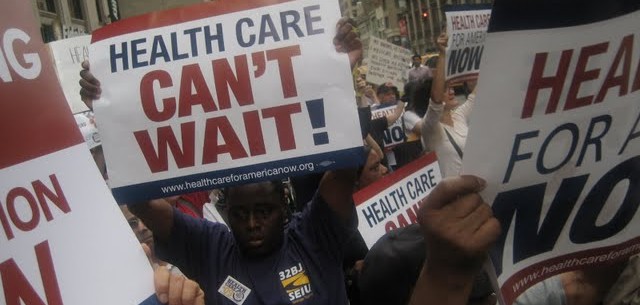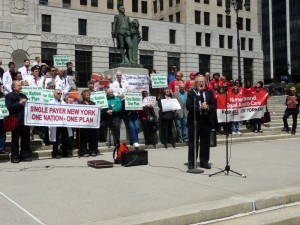Over 200 members and allies of the “New York Health” campaign held their annual legislative advocacy day on May 6, to push for a vote on the bill in the Assembly before the end they adjourn in late June. The bill, sponsored by Assembly Health Committee chair Richard Gottfried of the Chelsea-Hell’s Kitchen area (A. 5389A) and Senator Bill Perkins of Harlem (S. 2078A), has 72 co-sponsors in the Assembly and 18 co-sponsors in the Senate to date, and 61 organizations and trade unions have endorsed it.
Participants in the advocacy day made over visits to 81 members of the Legislature to ask for support for the bill, and to answer questions legislators and their staff. In particular, they pushed for Assemblymembers to sign-on to a letter to Assembly Speaker Sheldon Silver to bring the bill to the floor for a vote, and for those who’ve not yet endorsed the bill in either house to do so.
During the lunch hour, a rally was held in the park outside the Capitol that garnered significant media coverage. In addition to Assemblymember Gottfried and Senator Perkins, speakers included Dr. Matthew Hurley from Doctors’ Council SEIU, Judy Sheridan-Gonzalez from the New York State Nurses Association, Michael Milligan, author and actor in “Mercy Killers”, a one-man show about health care in America that has toured nationally in numerous cities, and Helen Shaub from 1199 United Healthcare Workers East.
The New York Health proposal would create a fully public health insurance program covering all New York residents. Everyone would be eligible to enroll, regardless of age, income, wealth, employment, or other status. The benefits would include comprehensive outpatient and inpatient medical care, primary and preventive care, prescription drugs, laboratory tests, rehabilitation, dentistry, vision care, and hearing care. Everyone would choose a primary care practitioner or other provider to provide care coordination who would help to get the care and follow-up the patient needs, referrals, and navigating the system. However, there would be no “gatekeeper” obstacles to care. Long-term-care coverage is not included at the start, but the bill requires that the Board develop a plan for it within five years of implementation.
Health coverage provided through the program would be publicly funded. Health care would no longer be paid for by insurance companies charging premiums, deductibles and co-pays that are not set according to ability to pay. Instead, New York Health would be paid for by assessments based on ability to pay, through a progressively graduated state payroll tax (paid 80% by employers and 20% by employees, and 100% by self-employed) and a surcharge on other income and placed into a dedicated New York Health Trust Fund. The current federal funds now received by the state for Medicaid, Child Health Plus, and the Affordable Care Act could also be added in, along with Medicare funding. A broadly representative Board of Trustees would advise the Commissioner of Health on the program. The “local share” of Medicaid funding —a major burden on local property taxes— would be ended.
Health care providers, including those providing care coordination, would be paid in full by New York Health, with no co-pays or other charges to patients. The program would develop alternative payment methods to replace old-style fee-for-service (which rewards volume but not quality), and would negotiate rates with health care provider organizations and practitioners. (Fee-for-service would continue until new methods are phased in.)

